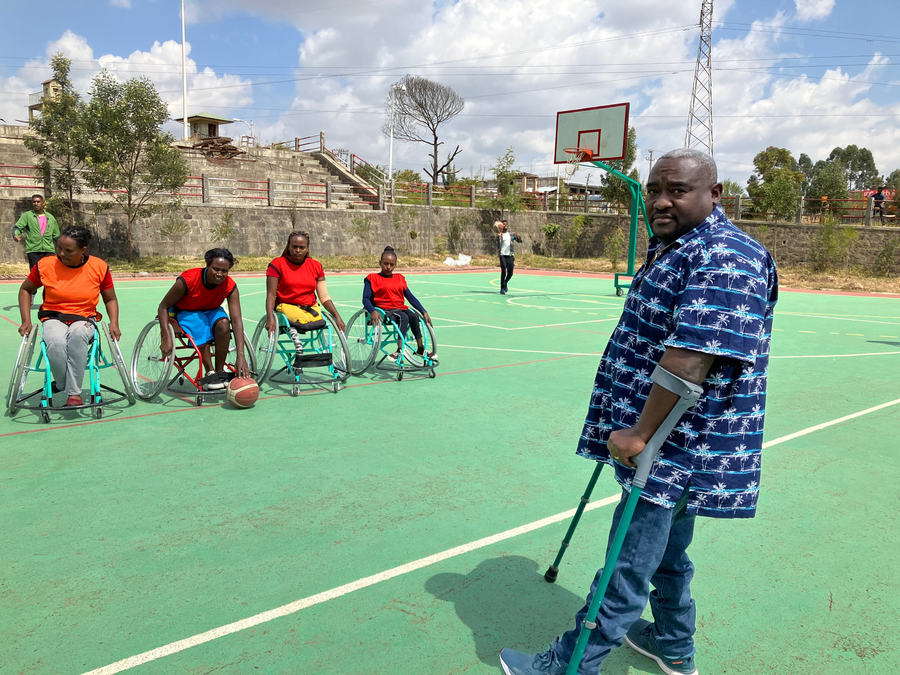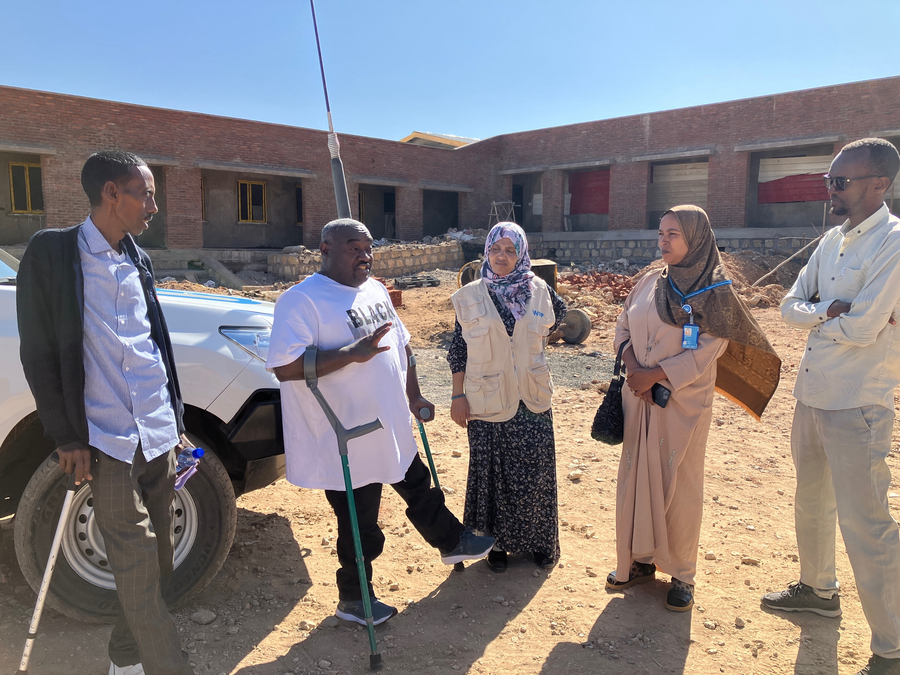Basketball v hunger: A slam dunk for the rights of persons with disabilities in Ethiopia

When he was a boy, Abayneh Gujo dreaded hearing the bell announcing the beginning of the sports session. Despite his love of sports and desire to join in with his classmates, his teacher forced him to stay in the classroom, alone, to watch over his friends’ belongings.
“What would you do at the sport class anyway?” the teacher said.
The physical isolation and exclusion were crushing. In time, however, he learned to channel the anger and frustration he felt to find his way through the injustice he was being subjected to.
Four decades on and he’s about to address a session of the 2022 Annual Partnership Consultation, which WFP organizes to discuss strategic priorities with hundreds of its NGO partners.
Via an NGO he co-founded, Gujo decided to pilot a new project embedding food and cash incentives into training programmes.
‘People with disabilities are not necessarily seen as worthy of being given the same access to food and nutrition and other services’
Disability inclusion is the subject of his speech – and what it takes to break psychological and physical barriers and foster meaningful participation for all. It’s a subject he knows a great deal about – Gujo is the president of the Federation of Ethiopian Associations of Persons with Disabilities and a key adviser to the World Food Programme (WFP) in developing a new disability inclusion workplan for 2023.
Gujo’s journey has been long and full of obstacles, but a loyal friend he found along the way helped him pull through: the humble basketball.
“Basket is my life, I played it since I was a child,” he says. “It helped me believe in myself. The idea of not being able to play it at professional level made me want to change the status quo.”
At university, Gujo challenged his university’s sports department to invest in facilities and equipment to allow sport training for people with disabilities. “Forget about it, sport for persons with disability is for westerners,” he recalls being told.
People with disabilities day: ‘I want to become an engineer’
He joined their gym and fell in love with powerlifting, “using recycled material, everything I could find, just so that I could train at home.”
“When I graduated from university, the first thing I did was to gather seven friends and start organizing wheelchair racing competitions,” he says. “In a matter of months, we found ourselves knocking at the door of the Government asking to establish the Ethiopian Paralympics Committee”.
“It took them two years to get a reply but it was worth the wait. Eventually the Government invited the seven of us to set up the Committee.”
That was a breakthrough for Gujo, his group of friends, as well as for 20 million Ethiopians living with disabilities. In the years that followed, Gujo embraced his new role as a leader of the movement fighting for the rights of persons with disabilities to practise sport.
To top it all, he also realized his dream to play for the Ethiopian national basketball team. However, “eventually I realized that we had to expand the scope of our mission”, he says. “You can’t be successful at sport if you don’t have anything to eat at home... so many young talented people I’ve met throughout my career were food insecure”.

“Malnutrition is one of the main causes of disability in Ethiopia,” he says. People with disabilities, in turn, are often excluded from programmes.
This lack of participation reduces people’s access to nutritious foods, says Cara Yar Khan, WFP’s new senior disability inclusion communication advocate.
“Of 1 billion people with disabilities, 80 percent live in developing countries,” she adds. “We are the largest minority group, transcending every ethnicity, nationality, culture and religion. And in every element of diversity, you will find people with disabilities. Yet, unfortunately, we are the most marginalized and excluded people in the world – we do not have universal access to basic human rights.
Read about how WFP cash grants empower people living with disabilities in Kenya
“In some societies we are seen as subhuman or unequal. As such, people with disabilities are not necessarily seen as worthy of being given the same access to food and nutrition and other services.”
When it comes to hunger, she adds: “Disability is a cause, contributor and consequence of malnutrition. We cannot achieve zero hunger in the world without bringing the concerns of people with disabilities to the fore – and targeting them methodically, because they are the hardest to reach and the most marginalized.”
Disability inclusion is firmly embedded in WFP’s new Strategic Plan. Involving people with disabilities and organizations with persons with disabilities in the way WFP develops, implements, and assesses its programmes is an organizational priority – persons with disabilities account for 15 percent of the world’s population. To support its work on disability inclusion, WFP is looking at partnership processes that allow persons with disabilities and their representative organizations such as the FEAPD, to participate on an equal footing with other partners.
Read more from wfp.org


